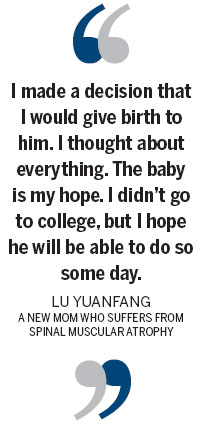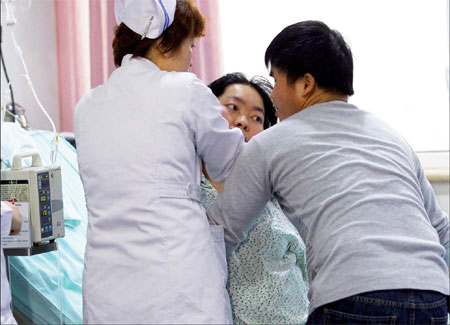The miracle that begot another
Updated: 2013-02-08 09:11
By Wang Qingyun (China Daily)
|
|||||||||||
|
Lu Yuanfang (center) during her prenatal examination at the Aviation General Hospital in Beijing on Jan 30. Zou Hong / China Daily |
When Lu Yuanfang gave birth, there was astonishment all around
Lying in the winter sun breastfeeding her newborn baby one day recently, Lu Yuanfang was enjoying one of the rare mother-son moments of the week. Though unable to hold him in her arms like most new mothers do, she managed to move her fingers and touched his ear and cheek gently.
The boy, delivered prematurely by Cesarean section on Jan 30 in Beijing, was discharged from the neonatal intensive care unit and met his mother four days later. It was one of the few cases, or possibly the only case, in which a woman with spinal muscular atrophy has successfully given birth in China.
Similar cases are so rare that hospitals have hesitated to deliver her baby, fearing unforeseen dangers.
"We couldn't find any case of a spinal muscular atrophy patient giving birth in China, and only 21 such reports worldwide," says Gao Guolan, president of Aviation General Hospital, where Lu underwent the surgery.
"We advise against pregnancy for patients with SMA. Pregnancy will possibly worsen their muscle atrophy, and make it harder for them to breathe. Also, there is a chance for the baby to inherit the disease."

Lu, 31, from Lanzhou, Gansu province, who needs a wheelchair to get around, says that for her and her husband the pregnancy was unexpected, but she did not want to lose the baby.
In August the couple went to Peking Union Medical College Hospital for a fetus test for a gene defect that causes SMA. The result was negative.
"I was no longer scared when the test result came out," Lu says, asked if she feared she might die during or after delivery.
"I made a decision that I would give birth to him. I thought about everything. The baby is my hope. I didn't go to college, but I hope he will be able to do so some day."
Mother and son are in stable condition, says Du Yuting, a hospital nurse who expresses admiration about the stoic way in which Yu has faced her ordeal.
"She suffered a lot the first night after the Cesarean section because she is more sensitive to pain than other people. The analgesic pump barely relieved her pain in her womb. But she refused our offer of more painkiller."
Lu's parents found her different to other children when she was about three.
"Other kids could run and stand up after crouching down, but not me," Lu said in a TV program in November.
One of her younger brothers, born about a year after her, showed similar symptoms. But their parents refused to give up hope.
"My mother didn't want us to be secluded. She carried me and my brother on her back and joined games played by kids outside our house," she said in an interview with Beijing Television. "She was our legs."
The parents took the two children to many hospitals, but the nature of their condition remained a mystery until a doctor in a hospital in Xi'an, Shaanxi province, told them that the children would be dead before they reached the age of 18.
"They carried us out of the hospital," Lu says.
"My mother sat on the stairs and began to cry; my father kept smoking. Then my father said he would go and make some money and asked my mother to take care of us at home, and that they would find a hospital that treats the disease."
Against doctors' predictions, Lu and her brother grew into adulthood.
She recalled that when she was about 19 and learned that her disease was incurable she was in such despair that she did not want to see anybody or talk to her parents, until she found strength in the writings of the blind American author and political activist Helen Keller.
"One day I came across Helen Keller's Three Days to See in a TV program, and I asked my father if he could find her writings for me," Lu says.
"He spent a whole day in bookshops in town before coming home with a book. I stayed up all night reading it, and read it several times.
"Then I thought to myself: Maybe I am not as smart as she was, but still I should live my life."
Though she is not employed, Lu says she has opened an online shop herself, and likes reading, doing paper cutting and cross-stitching in her spare time.
She met her husband, Luo Zhongmu, 39, in an online chat group in 2009.
Knowing Lu has muscular atrophy, Luo hopped on a train and visited her in Lanzhou on Feb 14, 2010. In April that year he quit his job in Hangzhou, Zhejiang province, found a job in Lanzhou, about 2,000 kilometers away, and settled there. A year later, Lu and her parents agreed to his proposal.
They married in May 2011. Before marrying, Lu's mother had taken care of her. Now her husband also takes care of her after work.
"My husband is a great man," she told China Daily.
"It's very hard for other people to take care of people like me so carefully like my parents have done for me. I may not be able to stay with him for as long as I would like to. I hope our son will continue to accompany him."
Luo told Beijing Television that his wife was the love of his life.
"She just can't move freely like others do, but she is no different than anybody else in any other ways. She is optimistic, strong and kind."
The couple have received more than 200,000 yuan ($32,000; 23,700 euros) in donations to help them raise their son.
wangqingyun@chinadaily.com.cn
(China Daily 02/08/2013 page25)
Today's Top News
Police continue manhunt for 2nd bombing suspect
H7N9 flu transmission studied
8% growth predicted for Q2
Nuke reactor gets foreign contract
First couple on Time's list of most influential
'Green' awareness levels drop in Beijing
Palace Museum spruces up
Trading channels 'need to broaden'
Hot Topics
Lunar probe , China growth forecasts, Emission rules get tougher, China seen through 'colored lens', International board,
Editor's Picks

|

|

|

|

|

|






